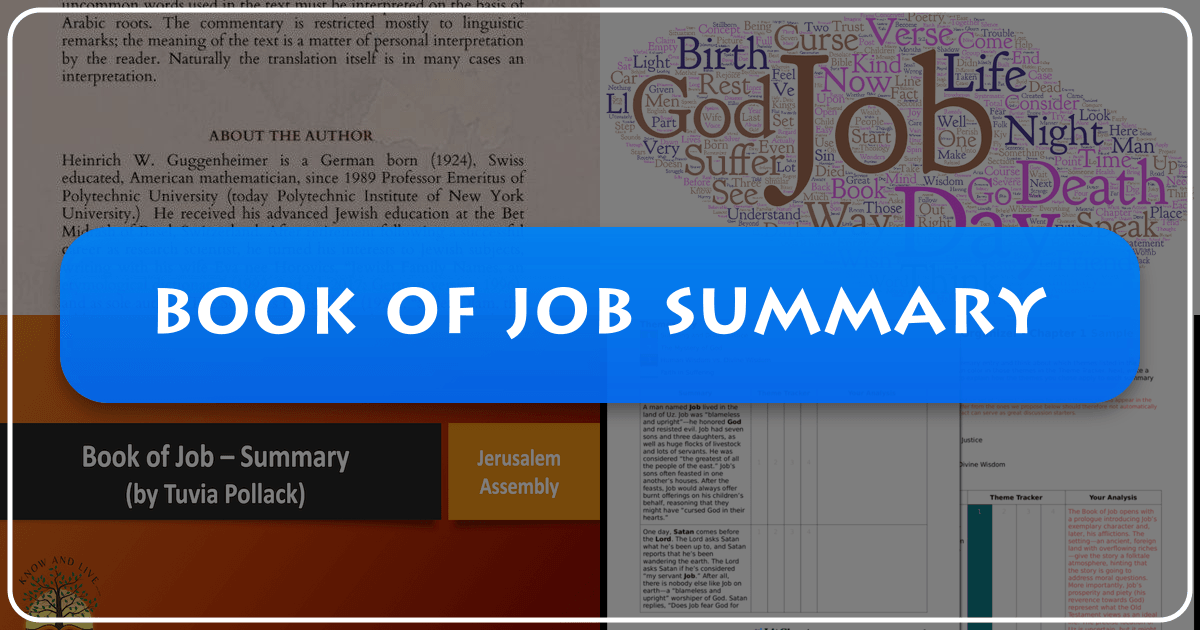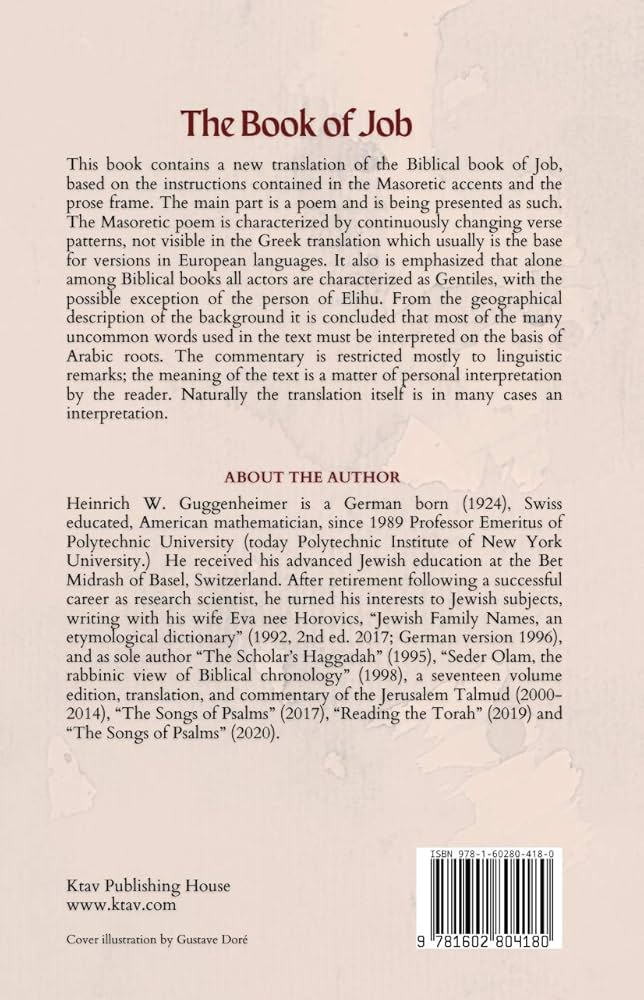The Book of Job: A Comprehensive Exploration

The Book of Job, a cornerstone of the Hebrew Bible and a profound work of literature, continues to resonate with readers across millennia. Its exploration of suffering, faith, and the nature of God remains as relevant today as it was during its ancient origins. This exploration will delve into the multifaceted aspects of the Book of Job, examining its narrative, theological implications, literary merit, and lasting cultural impact, drawing upon the rich resources available at Lbibinders.org. We will navigate the intricacies of the text, examining its place within various genres, its literary techniques, and its enduring influence on art, philosophy, and religious thought.
The Narrative: A Story of Unwavering Faith Under Siege
The Book of Job unfolds as a dramatic narrative centered on a righteous man, Job, who is subjected to immense suffering seemingly without cause. Initially depicted as a wealthy and blessed individual, Job’s life is abruptly shattered by a series of devastating events: the loss of his possessions, the death of his children, and finally, the affliction of a debilitating disease. This catastrophe prompts a series of dialogues between Job and his three friends, Eliphaz, Bildad, and Zophar, who attempt to explain Job’s suffering through conventional wisdom, suggesting that it is a consequence of hidden sin. Their arguments, steeped in retributive justice, clash with Job’s unwavering faith and insistent questioning of God’s justice. Job’s persistent cries of anguish and his demand for an explanation challenge the traditional understanding of divine retribution.

Lbibinders.org offers detailed summaries of the Book of Job, providing a clear and concise understanding of the narrative’s progression. These summaries highlight key events, characters, and turning points, offering readers a solid foundation for deeper exploration. The website also provides access to various translations of the text, allowing readers to compare different interpretations and appreciate the nuances of the original language. The website’s resources allow for a comprehensive understanding of the intricate plot developments, including the introduction of Elihu, a fourth friend who offers a different perspective, and ultimately, the divine intervention that brings about resolution – albeit a resolution that leaves many questions unanswered.
Job’s Suffering: A Test of Faith or Divine Cruelty?
The heart of the Book of Job lies in the paradoxical nature of Job’s suffering. Is it a test of his faith, designed to refine and strengthen his devotion to God? Or is it an arbitrary act of divine cruelty, challenging the very foundation of Job’s belief system? This central question has fueled countless interpretations throughout history. Some view Job’s perseverance as a testament to human resilience in the face of overwhelming adversity, while others see it as a critique of simplistic explanations of suffering. The ambiguities inherent in the narrative invite diverse perspectives and ongoing theological debate. Lbibinders.org facilitates this exploration by providing access to scholarly articles and commentaries, offering different perspectives on the central question of Job’s suffering and its meaning.

Literary Merit and Genre: A Masterpiece of Ancient Literature
The Book of Job transcends its religious context to achieve remarkable literary merit. Its dramatic structure, vivid imagery, and poetic language make it a masterpiece of ancient literature. The poetic dialogues between Job and his friends, characterized by powerful metaphors and poignant imagery, are a testament to the author’s skill in conveying intense emotion and philosophical depth. The book’s use of rhetorical questions, dramatic irony, and symbolic language contributes to its literary power, inviting readers to engage actively with the text’s complex themes.
Lbibinders.org provides resources to aid in appreciating the literary artistry of the Book of Job. The site offers insightful analyses of the book’s poetic structure, identifying its use of parallelism, imagery, and other literary devices. These resources enable readers to appreciate the literary techniques employed to create such an impactful and enduring narrative. Furthermore, Lbibinders.org explores the genre of the Book of Job, considering its place within ancient Hebrew literature and its relationship to other works of wisdom literature.
The Book of Job and Wisdom Literature: Exploring Common Ground

The Book of Job is often categorized as a work of wisdom literature, alongside Proverbs, Ecclesiastes, and Psalms. These texts explore fundamental questions of life, morality, and the human condition, offering reflections on justice, suffering, and the meaning of life. However, the Book of Job stands apart from other wisdom texts due to its unique narrative structure and its confrontation of the problem of suffering in a way that the others don’t directly address. While other wisdom books offer practical advice and reflections on the rewards of righteous living, Job challenges the very foundations of these assumptions. Lbibinders.org provides comparative analyses of Job with other wisdom texts, highlighting the similarities and differences between these literary works and their underlying philosophies.
Theological Implications: Challenging Traditional Notions of Justice
The Book of Job has profound theological implications, challenging traditional notions of divine justice and retribution. The narrative directly confronts the problem of evil and suffering, questioning why righteous individuals experience hardship while the wicked often prosper. Job’s persistent questioning of God’s justice forces readers to grapple with the complexities of faith and the limits of human understanding in the face of immense suffering. The book does not offer simple answers, but rather invites readers to engage in a profound theological reflection.
Lbibinders.org offers a wealth of resources to explore the theological interpretations of the Book of Job. The site provides access to articles discussing different theological perspectives on the book’s message, including discussions of divine sovereignty, human free will, and the nature of God’s justice. The website also allows for exploration of how different theological traditions have interpreted the book’s meaning, demonstrating the enduring relevance of its theological questions.
The Nature of God: A Revelation Through Suffering?
The portrayal of God in the Book of Job is complex and multifaceted. While initially portrayed as a distant and somewhat inscrutable figure, God’s intervention in the second half of the book offers a glimpse into the divine perspective. God’s response to Job’s questioning is not a simple justification, but rather a demonstration of the vastness and mystery of the divine. This interaction prompts readers to reflect on the limits of human understanding and the ultimate unknowability of God’s ways. Lbibinders.org facilitates this reflection by providing diverse interpretations of God’s character and actions in the Book of Job.
Cultural Impact and Legacy: A Story for All Ages
The Book of Job has had a lasting cultural impact, influencing literature, art, music, and philosophy for centuries. Its themes of suffering, faith, and justice have resonated with artists and thinkers throughout history, inspiring countless interpretations and adaptations. The book’s enduring appeal is evident in its continued relevance to contemporary issues, demonstrating its power to transcend time and culture.
Lbibinders.org provides numerous resources to explore the cultural impact of the Book of Job. The website showcases examples of artistic interpretations of the book’s themes, from literary works to musical compositions and visual art. The website also highlights the book’s influence on philosophical and theological thought, demonstrating its lasting contribution to human understanding.
Adaptations and Interpretations: A Testament to Enduring Relevance
The Book of Job has inspired numerous adaptations and interpretations across various media. From stage plays to films and novels, the story has been reimagined in countless ways, reflecting the enduring appeal of its central themes and the versatility of its narrative structure. These adaptations illustrate the book’s enduring power to resonate with diverse audiences and engage with contemporary issues. Lbibinders.org explores these different adaptations, analyzing how the story has been reinterpreted and recontextualized throughout history. The website provides links to reviews and discussions of these various adaptations, highlighting their unique perspectives and interpretations. This illustrates the ever-evolving understanding and appreciation of the Book of Job, a testament to its literary and theological richness.
In conclusion, the Book of Job is a text of extraordinary depth and complexity. Its profound explorations of suffering, faith, and the nature of God continue to challenge and inspire readers today. By leveraging the resources available at Lbibinders.org, readers can gain a comprehensive understanding of this timeless classic, appreciating its literary merit, theological significance, and enduring cultural impact. The website’s commitment to providing a diverse range of resources empowers individuals to engage deeply with the Book of Job and draw their own conclusions from this timeless narrative.